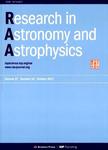GRB 210323A:Signature of Long-lasting Lifetime of Supra-massive Magnetar as the Central Engine from the Merger of Binary Neutron Star
作者机构:Guangxi Key Laboratory for Relativistic AstrophysicsSchool of Physical Science and TechnologyGuangxi UniversityNanning 530004China Department of AstronomySchool of PhysicsHuazhong University of Science and TechnologyWuhan 430074China
出 版 物:《Research in Astronomy and Astrophysics》 (天文和天体物理学研究(英文版))
年 卷 期:2024年第24卷第8期
页 面:32-41页
核心收录:
学科分类:07[理学] 070401[理学-天体物理] 0704[理学-天文学]
基 金:supported by the Guangxi Science Foundation(grant No.2023GXNSFDA026007) the Program of Bagui Scholars Program(LHJ)
主 题:(stars)gamma-ray burst general-(stars)gamma-ray burst individual(GRB 210323A)-stars magnetars
摘 要:Theoretically,a supra-massive neutron star or magnetar may be formed after the merger of binary neutron ***210323A is a short-duration gamma-ray burst(GRB)with a duration of lasting~1 *** light curve of the prompt emission of GRB 210323A shows a signal-peaked structure and a cutoff power-law model can adequately fit the spectra with E_p=1826±*** interestingly,it has an extremely long-lasting plateau emission in the X-ray afterglow with a duration of~10^(4)s,and then follows a rapid decay with a decay slope~*** temporal feature is challenging by invoking the external shock *** this paper,we suggest that the observed long-lasting X-ray plateau emission is caused by the energy injection of dipole radiation from supra-massive magnetar,and the abrupt decay following the longlasting X-ray plateau emission is explained by supra-massive magnetar collapsing into a black *** is the short GRB(SGRB)with the longest X-ray internal plateau emission powered by a supra-massive neutron *** this is the case,one can estimate the physical parameters of a supra-massive magnetar,and compare with other *** also discuss the possible gravitational-wave emission,which is powered by a supra-massive magnetar and its detectability,and the possible kilonova emission,which is powered by r-process and magnetar spin-down to compare with the observed data.



